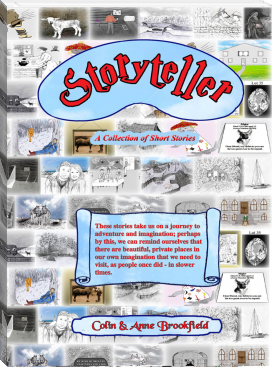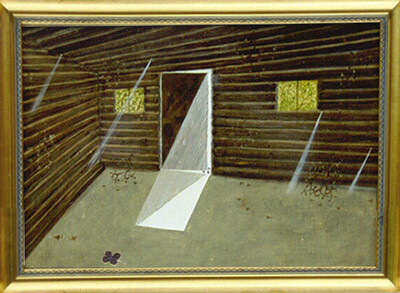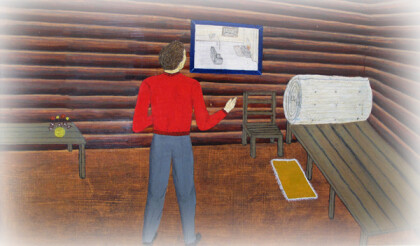Storyteller, Colin & Anne Brookfield [best fiction books to read .TXT] 📗

- Author: Colin & Anne Brookfield
Book online «Storyteller, Colin & Anne Brookfield [best fiction books to read .TXT] 📗». Author Colin & Anne Brookfield
The inevitable day arrived for his trial and he was taken under heavy military police escort to hear the mountains of evidence against him. His defence of course, was not supported by anything substantive, and would therefore be treated as unsupportable hearsay.
When the day of final court summation arrived, the full weight of impending military vengeance hung in the air like a mighty hammer over him, as he stood awaiting the known verdict.
Deliberations had been taking place in an anti-room, from which there now streamed a bewildering display of military top brass towards their high-placed seated positions of judgement at the far end of the courtroom. For a moment or two, they organised their papers on the wide mahogany table in front of them.
“George Fenton, formerly Major George Fenton of the Ninth Wessex....” snarled one of the judges. Then he stopped in mid-sentence, glowering towards George’s defence attorney who had just burst in through the main entrance. The attorney had done this, despite the military police remonstration that court entry, was now closed for sentencing.
There was fury on the bench faces and a demand for the attorney to be arrested. Ignoring the cacophony, he marched right up to the bench and slapped a document on it, just ahead of the military police. That was the last seen of the attorney as he was dragged from the court, which was now in turmoil.
George spent another two days back in his cell without a single word from anyone concerning the court fiasco. The bringing of such a high profile Court-martial to an ignominious halt at the moment of sentence had been a great embarrassment to the upper military echelons. For that reason, the courtroom atmosphere was even steelier when the Court-martial reconvened, only this time, he didn’t find himself centre stage. Instead, he was seated between two silent military policemen at the back of the court.
The oppressive court silence was suddenly broken as the main doors opened, and an army officer was marched in under guard. He was delivered to the same place in front of the judges that George had occupied two days previously.
“Lieutenant Harold Brooks,” said one of the judges, “you stand before us accused of the wilful murder of Major George Fenton’s platoon, consorting with the enemy for the sake of monitory gain and, for attempting to have Major Fenton blamed for your crimes.” Harold Brooks was found guilty and received the ultimate sentence.
It was not until the case against Brooks was over and done with, that George heard how his friends had saved him.
There was a knock on his office door; it was his new staff sergeant.
“There’s a friend to see you sir, shall I send him in?”
“Yes,” George answered.
“This looks rather better than the military prison where we last met,” said Captain Ralph Remmington with a broad grin on his face. “I thought you’d like to know how we got you cleared.”
“I’ve been wondering about that Ralph,” replied George handing him a glass of whisky. “What happened? How on earth did you manage it?”
“Well firstly, we discovered that the enemy had cleared out of the buildings where that fortune in the American currency had been stashed. Six of us paid it a visit, and collected the photos and letters that the bogus colonel had discarded and of course, the fingerprints from his right hand were on them. It was your observations that steered me into Brooks’ direction. Red hair you said, six feet four. That fits Brooks’ description. Also, the tip of a finger is missing from his left hand. Anyway, we got his prints off his wine glass in the Officer’s Mess. Once we had that conclusive match, the Provost Marshal – who incidentally is my father-in-law – gave the go-ahead to search Brooks’ accommodation. Lo and behold! We found a pair of the leather gloves with slight traces of mercury on them that he had been officially working with. We also found more traces on your side-arm that he had used to shoot your sergeant; we discovered it amongst the rubbish on the floor, and more on your letters that he had discarded.”
“My goodness, you have been working hard” said George.
“The stolen vehicle was obviously sold to an Arab in some Moroccan village, so we won’t see that again,” said his friend.
“I really don’t know what to say Ralph; I’ll never be able to thank you enough.”
“Oh and another thing George, with you out of the way, Brooks knew he could remain with your wife and then live out their charmed lives on his share of that US currency.
“Why doesn’t that surprise me?” said George scornfully.
“Oh, and before I forget! It’s well known that I am your best friend, so on the basis of that, your teary ‘dear lady wife’ paid me a formal visit. She wished to reconcile on the grounds that she had only acted the way she did, after Brooks told her that you were having an affair with a certain lady officer.”
“That woman never stops lying,” George remarked. “She wouldn’t recognise loyalty, even if she fell over it. Apparently, she’s become known as the ‘regimental bike’. Tell her Ralph, that it will never again be parked at my house.”
The PaintingI arrived late for the auction of furnishings at Bucklands Mansion in Sturton Newton, Dorset; another great family home destined to become a hotel. The upper floors had already been cleared of the most desirable items – the price paid for tardiness, so I rummaged through some basement bric-a-brac, but there was nothing there but rubbish.
Then as I turned to leave, there was an almighty crash, and a rickety old shelf from a higher level suddenly descended with its contents on me. Before I could struggle to my feet, a man rushed out of an adjacent passageway to investigate the noise.
“Hope you weren’t hurt!” he exclaimed as he helped me to my feet.
“No, I’m alright thank you,” I replied.
“Well, it’s not all bad luck is it? That’s an interesting old painting that’s fallen on you; though it’s not worth much I’m afraid. But look, as I’m one of the auctioneers, if you like the painting, it’s yours for two pounds.”

Still dazed, I handed him the money as it didn’t seem a bad picture.
Arriving home, I hung the new arrival on my living-room wall; its bareness had been in need of some distraction. Even so, it would probably take a while before I was used to the new addition.
The painting showed the inside view of an ancient log cabin distorted by time, with small unseeing ivy-covered windows. There were also old leaves scattered on the floor in a space empty of furniture.
The strangeness of the painting was not easy to ignore; it provoked the mind into asking questions. Fortunately though, I was feeling too tired to wrestle with conundrums, and it seemed that my comfortable chair had already claimed me for the evening. So the standard lamp was switched off and I settled down to muse amidst the rhythmic voices of the crackling logs in the fire grate, and its dancing flames that patterned the walls and ceiling.
It seemed that I had only been there for a couple of seconds when some subtle changes began occurring in the room, for although the fire had remained lively, its brighter reflections around the room were quickly diminishing, until everything was lost within the darkness – but not so the painting. Instead, it had become clearer, closer and a great deal larger.
Then, as a heavy log settled, disturbing the grate, the cabin seemed changed as the flames rose up higher. With the picture now clearer, the door of the shack seemed more slightly ajar, letting in a much brighter reach of sunshine across its floor, and over furniture that had not been there before. More worryingly, the scene was now so close, that I felt enveloped by it.
“That’s enough!” I heard myself shout, and reached to switch the standard lamp on. Instead, it was a rough log cabin wall that made contact with my hand. Moreover, the unbidden sunlight had now fallen warmly across my feet.
I was inside the cabin!

In an attempt to escape its strictures I spun around, only to be confronted by a wall that had not been in the painting and on it, hung a picture showing my room with everything in place as I had left them – except that my chair was empty.
Turning again, I panicked my way quickly through the simple furnishings towards the only opening. When I did, the beautiful scene beyond almost took my breath away – even more so as my eyes fell beyond the opened door – the ground was thickly decked with heavily scented violets. For a brief moment, I seemed to gather my senses and bent to pick one, just to see if it was real but in doing so, I also noticed a narrow, walked-upon track that ran through them, so my fear returned.
Who, or what was out there, and what would happen if I were caught in a place where I did not belong? I was now completely trapped and far beyond any ability to cope. My head was spinning and my eyes losing focus until everything seemed to slip away out of sight.
When I awoke, I did so with a sudden start. I was still in my chair in front of the log fire, and the relief was so enormous that I was soon laughing out loud in the grateful knowledge that it had all been a bad dream, until, with a sudden shock, I noticed at my feet…..a freshly picked violet.

One Good Turn
High in the clear blue sky, two spotter aircraft circled around one another over the battlefields like birds of prey. One was a British open cockpit Avro, the other, a German Fokker. At times they flew so close, they could each see the other’s young, smiling face as they waved and shouted enthusiastically to one another.
These were the opening chapters of the 1914-18 war; a time when the first daring young men fought for their own place in the sky, bringing with them what would prove to be the last vestiges of ‘Boys Own’ adventure and chivalry. These pioneering challengers of gravity did so in the earliest canvas, wood and wire biplanes – without parachutes.
Once again,





Comments (0)